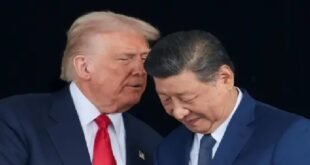08-10-2025
BLANTYRE: Malawi’s Peter Mutharika vowed to root out government corruption and rebuild an ailing economy after he was sworn in on Saturday for a second term as president of the southern African nation.
 Mutharika, 85, secured more than 56% of votes last month, defeating outgoing president Lazarus Chakwera, 70, who took 33%. Voters rejected Chakwera after five years of worsening economic crisis in one of the world’s poorest countries.
Mutharika, 85, secured more than 56% of votes last month, defeating outgoing president Lazarus Chakwera, 70, who took 33%. Voters rejected Chakwera after five years of worsening economic crisis in one of the world’s poorest countries.
The September 16 vote marked the fourth presidential contest between Mutharika and Chakwera.
Mutharika took the oath of office in a stadium in the commercial city of Blantyre packed with supporters dressed in the Democratic Progressive Party’s blue and white colours, as well as government officials and African heads of state.
In his inaugural address, he said his administration was inheriting a country in economic crisis.
Malawi is facing acute food shortages, cost-of-living pressures, and a lack of foreign exchange that has crippled businesses and led to persistent fuel shortages, he said.
“There is no money in government. Borrowing is extremely high, and nobody knows where the borrowed money has gone,” he said but he pledged improvements, saying: “We will fix this country.”
“I don’t promise you milk and honey. I promise you hard work, tough and painful decisions,” he said. “The honeymoon of looting government is over!”
Mutharika also appealed to the international community for investment. He addressed U.S. President Donald Trump directly, saying he would soon send a delegation to America to discuss his country’s prospects, especially after cuts in U.S. foreign aid.
 Chakwera’s Malawi Congress Party said in a statement that although the outgoing president was absent from the inauguration, he wished Mutharika success and good health.
Chakwera’s Malawi Congress Party said in a statement that although the outgoing president was absent from the inauguration, he wished Mutharika success and good health.
In June, Emmanuel Cherem, a 25-year-old gay man in Nigeria, tested positive for HIV two months after U.S. President Donald Trump’s administration cut access for at-risk groups like gay men and injecting drug users to medication that prevents infection.
Cherem admits he should have been more careful about practicing safe sex but had become accustomed to using the U.S.-supplied pharmaceutical. The drug – known as Pre-Exposure Prophylaxis, or PrEP – is typically taken daily as a tablet and can reduce the risk of contracting HIV through sex by 99%.
“I blame myself… Taking care of myself is my first duty as a person,” Cherem said at his gym in Awka, the capital of Nigeria’s southeastern state of Anambra.
“I equally blame the Trump administration because, you know, these things were available, and then, without prior notice, these things were cut off.”
Trump ordered a 90-day pause on foreign aid after taking office in January and halted grants by the U.S. Agency for International Development (USAID). The agency was responsible for implementing the bulk of the assistance under the President’s Emergency Plan for AIDS Relief (PEPFAR), the world’s leading HIV/AIDS initiative.
Sub-Saharan Africa remains the epicenter of the AIDS pandemic. Trump’s cuts have restricted the availability of drugs that millions of Africans have taken to prevent infection particularly vulnerable communities such as gay men and sex workers as aid groups and public health systems in Africa strove to roll back the disease.
The number of initiations, or people who have taken at least one dose of the drug, rose in Africa from fewer than 700 in 2016 to more than 6 million by late 2024, according to PrEPWatch, opens new tab, a global tracker. (Int’l News Desk)
 Pressmediaofindia
Pressmediaofindia




